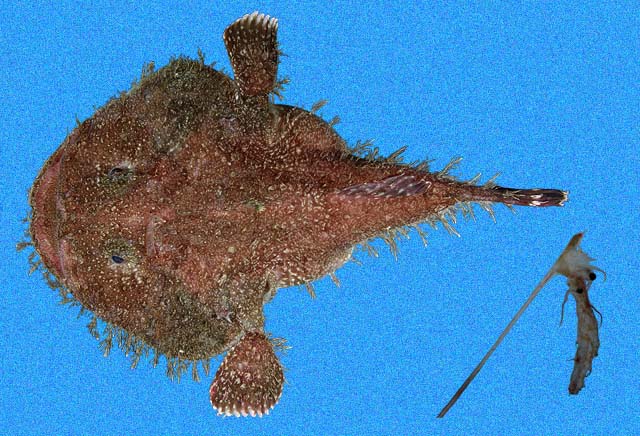| Lophiidae (Goosefishes) |
| 40 cm TL (male/unsexed) |
|
demersal; marine; depth range 15 - 311 m |
| Eastern Pacific: Baja California, Mexico to Peru. Range extends northward to the vicinity of Morro Bay, California (Ref. 36490). |
|
Dorsal spines (total): 3-4; Dorsal soft rays (total): 8-8; Anal spines: 0-0; Anal soft rays: 6-7; Vertebrae: 19-19. Head and anterior part of the body depressed; posterior part of body gradually narrowing; back and sides of head with numerous spines; first dorsal fin formed by 3 isolated cephalic spines, the first of which resembles a fishing rod (bearing a scale that looks like "bait" and two prominent, dark "eyes") and three more short, thin, post-cephalic spines connected by a low membrane. Back brown or dark brown; belly lighter; fins darker distally but may have light edges; caudal fin with a vertical row of 6 pale spots (Ref. 55763). Head is flattened and mouth is large. The first two dorsal fin spines are displaced far forward (onto the snout), and the first is modified into a lure to attract prey. Branchiostegal rays: 6 (Ref. 36490). |
| Juveniles and adults are benthic on the continental shelf and the upper regions of the continental slope (Ref. 9538). Oviparous, with planktonic larvae (Ref. 36490). Eggs are contained in floating gelatinous rafts (Ref. 36490). Probably caught as a by-catch of trawl fishing (Ref. 9538). |
|
Least Concern (LC); Date assessed: 22 May 2007 Ref. (130435)
|
| harmless |
Source and more info: www.fishbase.org. For personal, classroom, and other internal use only. Not for publication.
